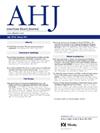NUDGE-CKD的基本原理和设计:一项全国范围内的随机析因试验,电子nudge增加了慢性肾脏疾病的指导药物治疗。
IF 3.7
2区 医学
Q1 CARDIAC & CARDIOVASCULAR SYSTEMS
引用次数: 0
摘要
理由:慢性肾脏疾病(CKD)的治疗指南推荐钠-葡萄糖共转运蛋白2抑制剂(SGLT2i)与肾素-血管紧张素系统抑制剂(RASi)一起作为广泛的CKD患者的一线治疗。然而,在临床实践中,指南的采用往往被推迟,可能导致可避免的相关发病率和死亡率。需要有效的策略来改善CKD患者的指导药物治疗(GDMT)的实施。目的:本试验将评估通过丹麦政府电子信件系统向CKD患者、他们的一般做法或两者兼而有之的电子信件推动在增加CKD患者GDMT方面的有效性。设计:NUDGE-CKD是一项2 × 2因子的全国性实施试验,在全科医生和患者水平均采用随机化。所有患有CKD的丹麦公民都可以使用丹麦官方电子信件系统,按照1:1的比例随机分配到常规护理(没有信件)或接受基于电子信件的CKD GDMT提示。所有丹麦全科医生的CKD患者分组也按1:1随机分为常规治疗组(无信件)或接受关于CKD GDMT的电子信息推送信。数据是通过丹麦行政卫生登记处收集的。主要终点是根据填充记录在干预交付的6个月内开具RASi或SGLT2i处方。次要终点包括主要终点的组成部分,以及新CKD GDMT用户的比例。预先指定的探索终点包括其他心脏-肾脏保护药物的处方、全科医生接触、肾脏生物标志物评估和下游临床结果。共有22,617名CKD患者被随机分配到患者水平的干预中,28,069名CKD患者被随机分配到1540名全科医生水平的干预中。干预信于2024年8月19日送达,目前正在进行随访(主要终点随访结束:2025年2月19日)。讨论:NUDGE-CKD是第一个全国性的随机试验,以电子信件为基础,向CKD患者和他们的一般做法推送,以增加CKD患者GDMT的吸收。该试验将提供证据,证明与患者和医疗保健提供者直接沟通对实际实施GDMT的有用性。本文章由计算机程序翻译,如有差异,请以英文原文为准。
Rationale and design of NUDGE-CKD: A nationwide randomized factorial trial of electronic nudges for increasing guideline-directed medical therapy in chronic kidney disease
Background
Treatment guidelines for chronic kidney disease (CKD) recommend sodium-glucose cotransporter 2 inhibitors (SGLT2i) as first-line treatment for a broad range of individuals with CKD, alongside renin-angiotensin system inhibitors (RASi). However, adoption of guidelines in clinical practice is often delayed, potentially leading to avoidable associated morbidity and mortality. Effective strategies are needed to improve implementation of guideline-directed medical therapy (GDMT) in patients with CKD. This trial will evaluate the effectiveness of electronic letter-based nudges, delivered via the Danish governmental electronic letter system to individuals with CKD, their general practices, or both, in increasing GDMT in individuals with CKD.
Methods
NUDGE-CKD is a 2 × 2 factorial, nationwide implementation trial, with randomization at both the general practice and patient level. All Danish citizens with CKD and access to the official Danish electronic letter system were randomized in a 1:1 ratio to usual care (no letter) or to receive an electronic letter-based nudge on GDMT in CKD. All Danish general practices with a patient with CKD on their patient panel were also randomized 1:1 to usual care (no letter) or to receive an electronic informational nudge letter on GDMT in CKD. Data are collected through the Danish administrative health registries. The primary endpoint is a prescription of RASi or SGLT2i within 6 months of intervention delivery based on fill records. Secondary endpoints include components of the primary endpoint, as well as proportion of new CKD GDMT users. Prespecified exploratory endpoints include filled prescriptions of other cardio-renal-protective medications, general practice contacts, assessment of renal biomarkers and downstream clinical outcomes. A total 22,617 individuals with CKD were randomized to the patient-level intervention, and 28,069 individuals with CKD across 1,540 general practices were randomized to the general practice-level intervention. Intervention letters were delivered on August 19, 2024, and follow-up is currently ongoing (end of follow-up for primary endpoint: February 19, 2025).
Discussion
NUDGE-CKD is the first nationwide randomized trial of electronic letter-based nudges delivered to individuals with CKD and their general practices to increase uptake of GDMT in individuals with CKD. The trial will provide evidence into the usefulness of direct communication with patients and healthcare providers for real-world implementation of GDMT.
Trial Registration
Clinicaltrials.gov: NCT06300086, registered March 7, 2024 (https://clinicaltrials.gov/study/NCT06300086)
求助全文
通过发布文献求助,成功后即可免费获取论文全文。
去求助
来源期刊

American heart journal
医学-心血管系统
CiteScore
8.20
自引率
2.10%
发文量
214
审稿时长
38 days
期刊介绍:
The American Heart Journal will consider for publication suitable articles on topics pertaining to the broad discipline of cardiovascular disease. Our goal is to provide the reader primary investigation, scholarly review, and opinion concerning the practice of cardiovascular medicine. We especially encourage submission of 3 types of reports that are not frequently seen in cardiovascular journals: negative clinical studies, reports on study designs, and studies involving the organization of medical care. The Journal does not accept individual case reports or original articles involving bench laboratory or animal research.
 求助内容:
求助内容: 应助结果提醒方式:
应助结果提醒方式:


